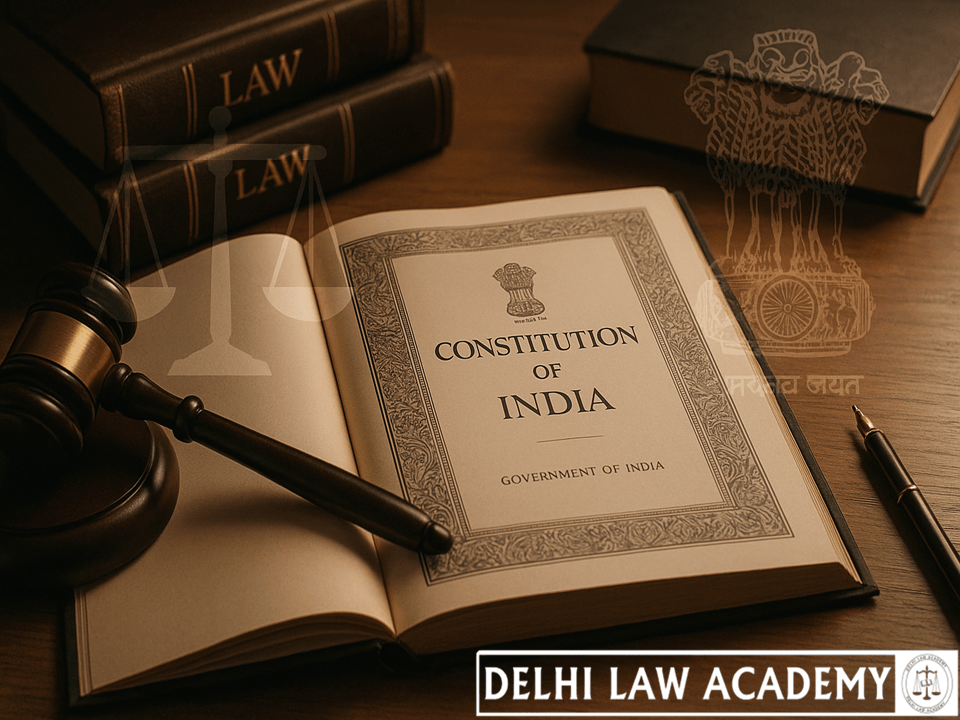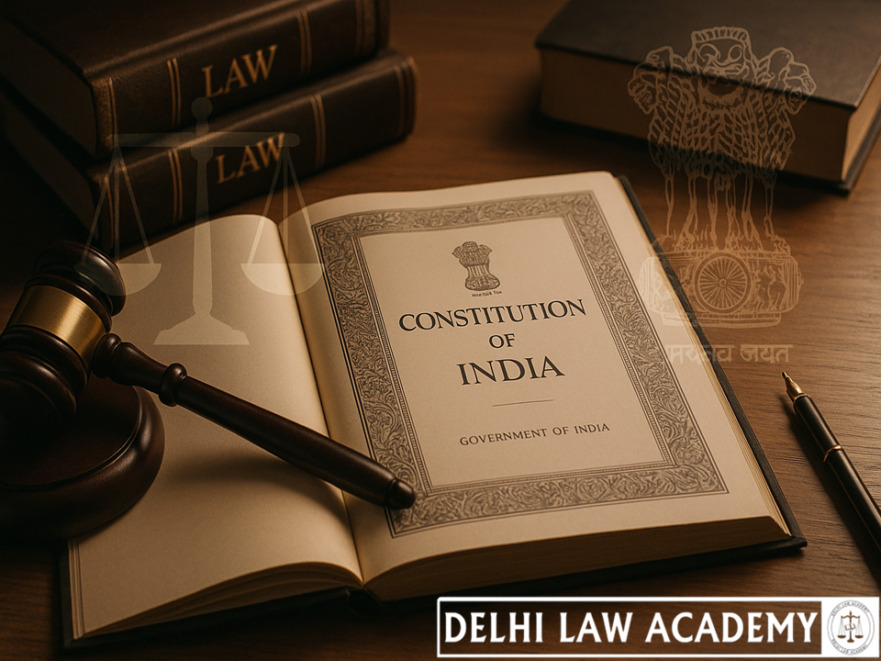
🏛️ State Legislature – Articles 193 to 212
Delhi Law Academy Jaipur | Simplified Constitutional Notes for RJS, DJS & PCS(J) Aspirants
⚖️ Constitutional Provisions
Article 193 – Penalty for False Voting
- Anyone who sits and votes in State Legislature
- before making oath or
- when not qualified to be a member or
- when disqualified from membership
- is liable to fine of 500 Rupees
Article 194 – Privileges & Immunities
- (1) Freedom of speech in State Legislature subject to rules, standing orders and Constitution.
- (2) No member liable to court proceedings for anything said or any vote given in Legislature or committees.
- (3) No liability for publication of reports or proceedings authorized by House.
- (4) Other powers, privileges and immunities to be defined by State Legislature by law; till then same as British House of Commons.
- Persons specified in Article 177 also enjoy similar privileges.
Article 195 – Salaries
- Salaries and allowances of members of State Legislature to be determined by State Legislature by law.
Article 196 – Passing of Ordinary Bills
- Bills (other than money/financial bills) may originate in either House.
- A bill (except money bill) is deemed passed only if both Houses agree.
- Lapsing of Bills: Pending bills lapse on dissolution of Assembly but not on prorogation.
Article 197 – Restricted Powers of Legislative Council
- If Legislative Council rejects a bill, holds it over 3 months, or amends it unacceptably, Assembly may repass it.
- If Council again rejects or delays it for 1 month, it is deemed passed in the Assembly’s form.
Article 198 – Passing of Money Bills
- Money Bill can be introduced only in Legislative Assembly.
- Council may only recommend amendments within 14 days; Assembly may accept or reject them.
- If not returned in 14 days, the Bill is deemed passed by both Houses.
Article 199 – Definition of Money Bills
- A Bill is a Money Bill if it deals exclusively with:
- Imposition/abolition/alteration of taxes
- Borrowing by State Government
- Custody, withdrawal or appropriation from Consolidated Fund of State
- Speaker of Legislative Assembly decides whether a Bill is a Money Bill; decision is final.
- Speaker’s certificate is endorsed on every Money Bill before sending it to Council or Governor.
Article 200 – Assent to Bills
- Bill passed by Legislature is sent to Governor.
- Governor may:
- Give assent,
- Withhold assent,
- Reserve Bill for President’s consideration, or
- Return a Bill (other than Money Bill) for reconsideration.
- If passed again, Governor must give assent.
- Governor shall reserve a Bill that endangers the powers of High Court.
Article 201 – Bills Reserved for President
- When reserved, President may:
- Assent,
- Withhold assent, or
- Return Bill (other than Money Bill) for reconsideration within 6 months.
- If passed again, it is presented again for President’s consideration.
Article 208 – Rules of Procedure
- Each House makes its own rules for regulating procedure and conduct of business.
Article 209 – Financial Business
- For timely completion of financial business, State Legislature may regulate the conduct of such business by law.
Article 210 – Language
- Proceedings in State Legislature may be in the official language of the State, Hindi or English.
- Members may be permitted to speak in their mother tongue if unable to express in Hindi/English.
- Use of English may continue beyond 15 years if Legislature provides by law.
Article 211 – Restriction on Discussion
- No discussion shall take place in State Legislature on conduct of a judge of Supreme Court or High Court in discharge of duties.
Article 212 – Bar on Courts
- Courts cannot question validity of proceedings in Legislature for procedural irregularities.
- Officers or members empowered to regulate procedure, conduct of business, or maintenance of order are not subject to court jurisdiction for such acts.
📘 For more Constitution Notes, visit
www.delhilawacademy.com
📘 Stay Ahead with Delhi Law Academy!
Get access to free monthly current affairs, read our insightful blogs,
and explore free study resources prepared by experts at DLA Jaipur. 🚀
💬 Frequently Asked Questions on State Legislature (Articles 193–212)
🗳️ What is the penalty for false voting under Article 193?
Under Article 193, any person who sits or votes in the State Legislature before taking oath, or while disqualified or unqualified, is liable to a fine of ₹500 for each day of such participation.
🏛️ What are the privileges and immunities of the State Legislature under Article 194?
Article 194 grants freedom of speech to members within the Legislature, immunity from legal proceedings for anything said or voted upon, and protection for official publications of proceedings. Other privileges remain the same as those of the British House of Commons until defined by law.
💰 What is a Money Bill in the context of State Legislatures (Article 199)?
A Money Bill under Article 199 includes provisions related to taxation, borrowing of money, custody or appropriation from the Consolidated Fund of the State. The Speaker’s decision on whether a bill is a Money Bill is final and certified before transmission.
📜 How does the Governor give assent to Bills under Article 200?
As per Article 200, the Governor may assent, withhold, reserve, or return a Bill (except a Money Bill) for reconsideration. If the Bill is passed again, the Governor must give assent. Bills endangering High Court powers must be reserved for the President.
⚖️ Can courts question the proceedings of State Legislatures under Article 212?
No. Article 212 bars courts from questioning the validity of any legislative proceedings due to procedural irregularities. Presiding officers regulating procedure or maintaining order are not subject to court jurisdiction for their actions.
🗣️ In which language can the business of the State Legislature be conducted (Article 210)?
According to Article 210, proceedings may be conducted in the State’s official language, Hindi, or English. Members may speak in their mother tongue if unable to express in the other languages. The continued use of English can be extended by law.
Contact us
📍 Delhi Law Academy – Jaipur Branch
6C, Tower 2, Coaching Hub, Pratap Nagar, Jaipur – 302033
📞 Phone:
+91 9911916552
+91 8447285606
✉️ Email:
contactus@delhilawacademy.com

